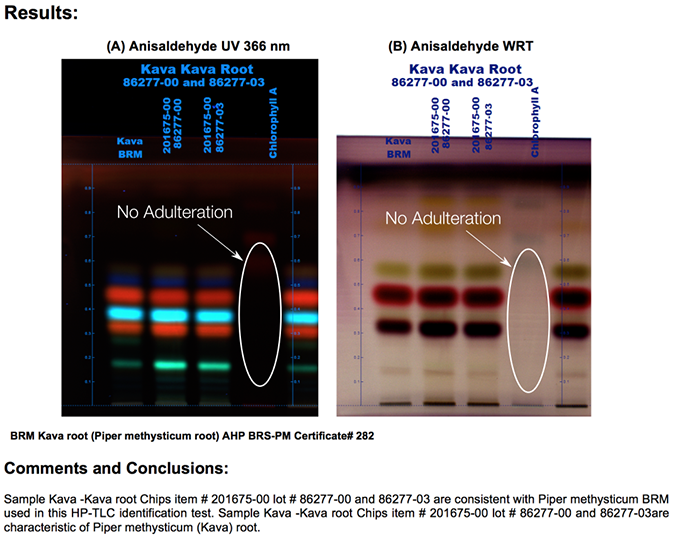
By Dan McGarry in Port Vila
In response to last weekend’s reports of complaints about allegedly “tainted” kava, Vanuatu-based exporter Peter Colmar has provided clear scientific evidence that the product he provided to American suppliers is “noble” and shows no trace of tainting.
When the Vanuatu Daily Post shared these results with Agriculture Minister Matai Seremaiah, he replied: “The results submitted to me today will be shared to our officials for assessment.”
In a follow-up telephone call, he applauded Colmar’s efforts to defend the good name of his company.

At the heart of last weekend’s article was a complaint from an American source about the quality of kava allegedly supplied by Sarami, Colmar’s Santo-based kava export operation.
The complaint originated from a letter written by Garry Stoner, founder of Pure Kava, a kava advocacy group.
Stoner wrote to Starwest Botanicals, an herb wholesaler/retailer based in Sacramento, California, founded in 1975. Stoner’s letter included a chemical analysis, which he claimed was derived from a 2015 test of the company’s retail kava powder product.
Part of the analysis consisted, he said, of what is known as an HPLC chromatogram. The letter claims to show signs of Chlorophyll A, which is only found in leaves.
Stoner wrote that so-called “aerial” matter was present in the sample—leaves, twigs and skin, for example—that contain “pipermethystine, an alkaloid with a known history of toxicity”.
Warehouse visit
Another component of the story alleged that Colmar was responsible for “drowning” the US market with what is colloquially known as “two-day” kava. The basis of this complaint was a visit paid to Colmar’s warehouse by kava proponent Mathias Schmidt.
Dr Schmidt holds post-doctoral qualifications in plant biology and is a leading advocate for the safe and responsible marketing of kava in the European Union.
In the article, Dr Schmidt alleged that approximately 60 tons of kava tainted with “two day” varieties had been shipped to the United States recently. He listed four companies, Kumars Import, Naturex Inc, Concentrated Alie Corps, and Starwest Botanicals, as recipients.
The Daily Post requested further documentation concerning these other companies, but received only bill of lading records for the Kumars, Naturex and Concentrated Alie shipments. The accusation, it transpired, was based on a single sample from Starwest.
Following the publication of the article, Colmar angrily and vehemently rejected these accusations as “lies”. He asserted that Dr Schmidt’s allegations of “two day” kava dated back to a visit to his Santo warehouse “5-7 years ago”.
At the time, Colmar said, he provided Dr Schmidt with two samples, at least one of which was known to contain impurities. Colmar stated that he provided the knowingly tainted material in order to dissuade local farmers from attempting to bulk out their product with substandard material.
Presented with Stoner’s chemical analysis, Colmar responded with two separate analyses. One was supplied by Root of Happiness, a California-based kava supplier. The other was supplied by Starwest, the company that received the original complaint from Stoner.
Calm, euphoric feeling
Both the Root of Happiness and Starwest analyses show clear indications of kavalactones, the chemical component of kava that provides the calm, euphoric feeling that makes kava so popular.
Neither of the samples showed any sign of Chlorophyll A, nor did they show any signs of Flavokavain, a chemical compound present in so-called “two day” kava varieties.
As the Daily Post continued its investigation of the complaints and followed up extensively with Colmar and his representatives, a number of key facts became clear:
There is no direct link between the allegedly adulterated Starwest sample and Colmar’s kava.
According to the Stoner’s letter, the sample was obtained from a customer, who presumably bought the retail product either online or in a shop.
Starwest purchases kava from multiple suppliers, so even if that particular batch of kava did contain impurities—which Colmar insists is not the case—it does not follow that they originated from Colmar’s Santo operation.
The Starwest analysis, by contrast, is based on a shipment received from Colmar. The test was conducted months after Stoner’s analysis, but on the same dried powder product. It unambiguously shows that Colmar’s kava is “noble” and without “aerial” components.
Identical results
The Root of Happiness analysis shows identical results.
Both analyses were certified. According to a CV supplied following a request from the Daily Post, Stoner has no formal certifications relevant to the conduct of these tests. He has written one paper and made at least one presentation on the topic, however.
Colmar claims that Stoner’s equipment is antiquated and sub-par. When we asked Stoner to tell us more about his operations and methodology, he declined to provide any detail, stating only: “Analyses were made with state of the art instrumentation.”
Addressing the accusation that Colmar’s export operation was using the Palisi variety of kava, which he labelled a “two day” variety, Dr Schmidt was adamant.
In an early response to the Daily Post, Dr Schmidt wrote: “I have been in Peter Colmar’s warehouse myself, saw the piles of two-day material for myself, took a sample of his peelings, and could demonstrate that this was Palisi.”
Asked about this, Colmar replied that this visit took place “5-7 years ago”, before Dr Vincent Lebot had even formalised the concept of two-day kava, and long before any regulation or legislation was in place controlling its export.
He further stated that “an independent Santo kava exporter has had Palisi tested by the Vanuatu food lab and the result was noble, so either the classification of this kava type is wrong or the testing is not reliable”.
Visit happened in 2011
Only when asked specifically about the timing of his visit did Dr Schmidt admit that it took place in 2011, supporting Colmar’s version of events.
Colmar told the Daily Post he had concluded that Dr Schmidt was not acting in good faith, and he was considering his legal options.
Given the information obtained in our follow-up to this story, and based on numerous lengthy conversations with the parties concerned, it is now clear that, despite a good faith effort to contact the company for comment, the Daily Post did not present a complete picture in its original story.
This newspaper has sent emails containing the additional chemical analyses to Ambassador Joy, to Biosecurity and to Minister Matai Seremaiah, and asked them whether they still maintain their original opinion of the Santo-based kava exporter.
The Minister of Agriculture replied: “I am not a scientist to evaluate the results provided. However, my position as minister for MALFFB, if the exported kava is of good quality then there is no need for VCMB to cancel his/her licence.
“Every exporter must understand the difficulty of getting the kava cleared in the EU etc. and the least they could do is support the government to ensure only good quality if purchased from the farmers and to be exported.
“The ministry will be getting hard on those exporters who intentionally export low quality kava once the Kava [Act] Amendment is gazetted next week. In many occasions our staff at bio security were threatened while on duty to carry out quality checks. This has to stop.
“As long as the exporter (Sarami) complies with our laws and regulations, there will be no need for cancellation of their licence.”
‘Clean’ test testimonials
According to testimonials received by the Daily Post, Colmar is a supplier with a sterling reputation, whose products test “clean” on a consistent and regular basis. Any suggestion that his operation is not operating to a high standard is not supported by the evidence now in our possession.
The Daily Post sincerely apologises if readers inferred anything else from last week’s article. We regret that these mitigating and exculpatory facts were not available at the time the original article was printed.
Furthermore, we thank Colmar and his son Chris for their positive and helpful engagement in setting the record straight.
The Daily Post will report further on allegations of unequal treatment of kava suppliers, and will provide updates concerning reactions to the new data by public officials as and when they become available.
Dan McGarry is editorial director of the Vanuatu Daily Post. This article was published today in response to an earlier article published by the Daily Post and Asia Pacific Report.














































So the product that was tested at RANDOM by an outside organization known as “True Kava ” not Pure kava, comes out with tainted results… but the test provided BY THE COMPANY IN QUESTION is perfectly fine and untainted.. huh… what a crazy situation .. I wonder which one is right? who has more to gain .
True kava which is all paid for by Garry and donations and Dr smchidt
Or the company in question?
I think it’s obvious
Also the fact that their kava still provides euphoric effects … means nothing. Tuedi is euphoric.. and stems and peeles to not alter the effects of kava at all.. they just are dangerous and silent.
Zac, I think you missed a point or two. Garry Stoner, who has literally 0 qualifications “tested” Starwest’s Kava and came to the conclusion that it had aerial parts, soil and rocks, and was also tudei. Stoner did this all from his non licensed home lab (legal?) and through his amazing deductive reasoning and keen scientific method, erroneously assumed that Starwest only buys from Sarami. He then decided to talk with Dr. Schmidt, who specifically asked Sarami for Tudei samples for his research 7 years ago and used these things in bad faith to launch a very serious accusation which defamed not only the largest exporter of kava in the world, but also several US based companies, as well as the entire Vanuatu kava market as a whole. This was all done by some washed up old kook in an armchair who has never visited an island or even seen a kava plant growing in the ground. It could have ruined Kava.
Interesting comments Kiki, but far from the truth. I’m completely qualified, and any in doubt can view my credentials and references on truekava.com. Dr. Schmidt, the government of Vanuatu, PHAMA, NZ Aid, Australian Aid, and many others have been working to rebuild the kava industry in Vanuatu for years. These individuals and groups have successfully repealed the 2002 kava ban and established standards that will enable Vanuatu to once again become a world leader in kava. This comprehensive plan was developed with the full involvement of the Government of Vanuatu, and is aimed specifically at helping traditional small farmers, protecting them from large corporations like Sarami.
I am sorry for the Daily Post journalists who have apparently been threatened by Peter Colmar and his associates.
Many people know that Peter Colmar is a major source of two-day kava and that he disagrees with all kava experts and ignores Vanuatu’s government, but people are afraid to say anything. It’s been this way for years and it’s a shame that it takes outsiders to finally say something and demand action.
I am glad that Mr Stoner (a renown expert on kava science and testing, the operator of the largest dedicated kava-lab in America and the founder of a NOT FOR PROFIT organization defending kava’s reputation and fighting for its good name), together with DR Schmidt and DR Vincent Lebot (two of the best international scholars, not affiliated with any kava seller) have decided to speak up and act to protect Vanuatu’s reputation.
Think about this. On one side you have the top kava scholars and a dedicated non-profit organization. They say they have a lot of evidence, not just what the newspaper mention. And the Vanuatu government also knows about makas exports, two day exports and other shady activities. On the other side we have the company in question denying the allegations, threatening the journalists, insulting the government and producing fake tests from a shady business in America. Who do you trust?
Comments are closed.